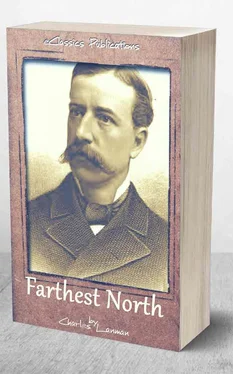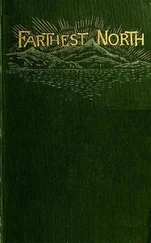It was about this time that a specimen of American royalty visited Fort Leavenworth with his daughter, to whom young Lockwood had an opportunity of being polite. This was a great cattle-man from Texas, who was said to have fenced in a grazing-farm of a million of acres, and who numbered his cattle by tens of thousands. His name was King, and his title in all the West was the “Cattle King of Texas.” The father and daughter were much interested in an inspection of the fort, where they were hospitably entertained. From that time onward for several months, the dullness of garrison-life was only relieved by parties, dinners, and theatrical amusements in the city, by the presence of an encampment of Indians near the post, and by attendance at a grand reception and ball given at Kansas City by the Governor of the State. The letters written by young Lockwood during all this period are elaborate and full of interest to his parents, but not enlivened with any incidents of public interest. The garrison courts seem to have demanded very much of his attention, because of his skill in taking down testimony by short-hand, and he was frequently compelled to devote many of his sleeping hours to the duty of writing out his notes.
While going from the fort into town one day, he witnessed what he called an awful spectacle—three little boys in a state of intoxication. This recalled the fate of one of his former companions in the East, who had become a drunkard, and in a letter to his father he recorded the following: “Liquor is certainly a terrible curse; one constantly sees illustrations of this in the army. You rather startled me in a recent letter by telling me you had taken the pledge. Had you departed from your abstemious habits in this respect? was my first thought, but I was at once relieved by seeing that your allusion was to something else. A rule that I have had for a long time and seldom depart from, is not to drink before sunset and never to do so in a saloon. It is rather superfluous in me to have any such rules, as it is very seldom that I have a desire to touch spirituous drinks, and then I partake only for the sake of not appearing to be rude in social matters.”
On one occasion, after describing a splendid dinner which he had attended, he branches off upon his own experiences in that line, stating that he had been caterer for the “Bachelors’ Club” during the current month, and playing housekeeper for the first time in his life. He was striving to feed the mess well and to reduce expenses, the individual assessments amounting to twenty-four dollars.
“We have a good deal of fun,” he says, “at the mess; among other ways, by a resolution of the officers that I shall keep a record of the puns, jokes, profane expressions, etc. Any one indulging in these is put back or set forward on a regular motion and vote by the members, and any one getting a record of fifteen has to send to the store for a supply of cigars. One of the mess, having the bad habit of saying, ‘O Lord!’ and ‘Damn it!’ when excited, gets a great many bad marks, and is made unhappy. The standard of wit being very high, one seldom ‘goes ahead.’”
In May, 1878, when it was doubtful what Congress would do about reducing the army, and Lieutenant Lockwood thought that he might decide to leave the service, he discussed with his father the question of future employment. He thought favorably of a position in some telegraph company, thereby proving that, in all his studies and leisurely occupations, he was practical, and no visionary. Another idea that he had was that he might play Cincinnatus, and again go upon the farm. He also thought of a position in connection with the Signal Service as one that would suit him should he, from any cause, be compelled to leave the army; and this suggestion, taken in connection with his subsequent career, is notable. He went so far, indeed, as to ask his father about the practicability of securing such a position in that corps, and desired especially to know all about the necessary qualifications.
On one occasion, after alluding to the possibility of his being transferred for duty to some other place, he says that it might be a good thing for him, as he could not remain at Leavenworth always, and yet he dreaded to be sent to some “far-distant and isolated post.” When he wrote those words, how little did he imagine that he would eventually close his earthly career in a land of supreme desolation within the Arctic Circle!
Subsequently—July, 1878—he resumed with special earnestness the consideration of being detailed for duty in the Signal Service, and, with his father’s approbation, made the proper application. He thought the proposed transfer would be of benefit to him in many ways, and if he failed to make it so, he would very quickly be ordered back to his regiment.
In September he was ordered to St. Louis for the purpose of conducting some recruits westward, and for a short time it was uncertain whether he would have to go to Texas or the Territory of Wyoming, whereby were shown the uncertainties which attend life in the army. He took the recruits to Fort Laramie, and, on his way, was in danger of being embroiled with the Cheyenne Indians under Sitting Bull, but returned in safety, by way of his old camp at Omaha, to his company at Fort Leavenworth. During another trip, which he soon after took with his company, he saw in western Kansas many Russian immigrants. They were poor, and had settled at great distances along the streams to be near water, not always easily found in these regions. They knew nothing of the recent outbreak of the Indians, and, indeed, many of them had never seen an Indian. The lieutenant also stumbled upon a colony of Swedes, and at one place saw three women, whose husbands had been killed by the Indians, and who were weeping bitterly in their distress. While his company was on the march he generally kept at the head of the column, thereby receiving the title of Pedestrian of the Command. Much of the country over which they traveled was monotonous in the extreme—wide stretches of prairie reaching to the far horizon. Antelopes and Jack-rabbits were frequently seen, and sometimes were fired at without success. But, to his mind, the most wonderful features about the country were the countless tracks and bones of the buffalo, while not a living animal was seen. One of his guides informed him that in former times he had killed three hundred in a single day, so that it was no wonder that they were now extinct.
In a letter to one of his sisters, in October, he speaks of his return from this chase after Cheyenne Indians, and then goes on to mention some amusing incidents that had occurred at the post, and gives her this bit of artistic advice: “I hope you will profit by your talent for painting, not bury it in the ground, like the foolish steward. Painting is a great and very popular accomplishment; there is none perhaps more so.” No matter what happened in or about the garrison, he seemed always ready with his common-sense opinions referring to passing events. For example, after alluding to the burning of a stable, with thirteen mules, when some of them that had been released ran into the fire from fright, he thus proceeds: “I was talking ‘over the wire’ with one of the men on our telegraph line, and what he said is no doubt true, and shows the short-sightedness of the Government. He said that he and many of the other soldiers had damaged or lost their clothes, and that if soldiers were reimbursed for their losses on such occasions, they would work with much more vim and energy, and that he heard one man say that he would not lose his new pantaloons for all the mules in the stable. Of course, in the case of a private house on fire, I believe the enlisted men would risk everything; but in cases of this kind, where Government property only is concerned, this feeling has its existence. There is, too, some reason for this feeling; for, no matter how hard a soldier or officer may work at a fire to save public property, the Government will not reward him even by the restitution of his clothes. Nothing short of an act of Congress would be authority for such an issue.”
Читать дальше












